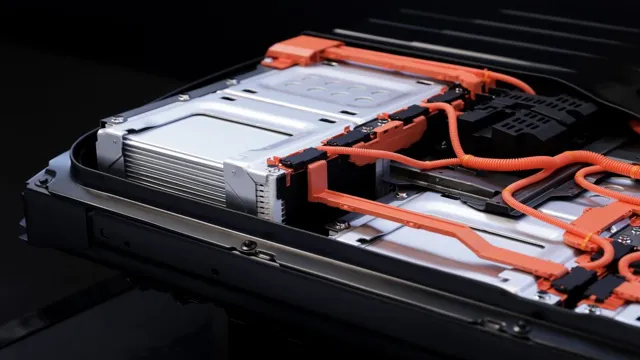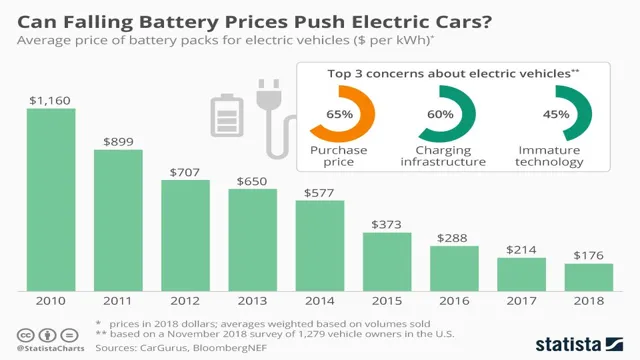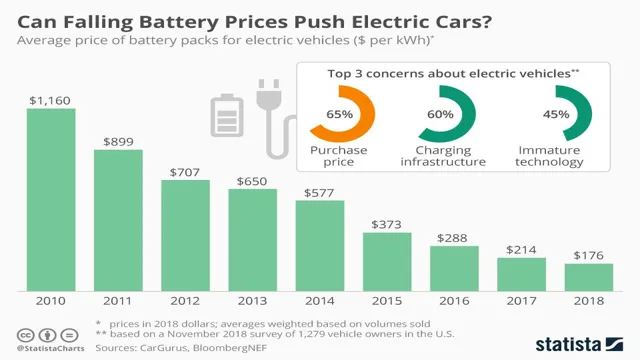Unraveling the Myth: Is the Cost of Electric Car Batteries Really Higher than the Car Itself?
Are you considering buying an electric car but unsure about the cost of the batteries? Electric cars are quickly gaining popularity due to their eco-friendliness and efficiency. However, the cost of their batteries has often been a deterrent for many buyers. In this blog, we’ll dive into the fascinating world of electric car batteries and analyze the actual cost vs.
car. We’ll take a closer look at the factors that contribute to battery cost, including their lifespan, charging time, and energy density. We’ll also explore how much of the car’s overall cost is affected by the battery.
So buckle up and get ready to discover the truth behind the hype of electric car batteries.
Initial Costs
When it comes to buying an electric car, one question that many people ask is, “Do electric car batteries cost more than the car?” The short answer is: it depends. Initial costs for an electric car can be higher than a traditional car due to the cost of the battery. However, when weighing the long-term benefits, the answer becomes a bit more complicated.
Electric cars offer significant savings on fuel costs, as they don’t require as much maintenance as petrol-powered cars. The cost of the battery can also be offset with government incentives and tax credits, which can lower the overall initial cost. It’s important to do your research and take into account your driving habits and budget before deciding if an electric car is the right choice for you.
Ultimately, the upfront cost of an electric car may be higher, but the long-term savings on fuel and maintenance can make it worth it.
Comparing Prices of Electric Cars and Batteries
When comparing the prices of electric cars and batteries, it’s important to take into account the initial costs. Electric cars generally cost more than traditional gas-powered cars, with prices ranging anywhere from $30,000 to over $100,000. This higher cost can be a deterrent for many consumers, but it’s important to remember that electric cars also come with lower operating costs, including lower fuel costs and lower maintenance costs.
Additionally, the cost of batteries plays a significant role in the overall price of an electric car. Battery costs have been steadily decreasing over the years, but they still make up a significant portion of the overall cost of an electric car. As more and more car manufacturers produce electric cars, it’s likely that we’ll see even more price drops in the future.

Factors Affecting Electric Car and Battery Pricing
Initial Costs When it comes to electric cars and battery pricing, the initial cost is one of the most significant factors affecting the price. Electric cars are generally more expensive than their gasoline counterparts, with some models costing up to double the price. This is due to the high cost of research, development, and manufacturing of electric vehicles.
Furthermore, the battery itself can be a significant expense, accounting for up to a third of the vehicle’s total cost. However, the initial cost can be offset by government incentives and tax credits, making electric vehicles more appealing to potential buyers. Additionally, the cost of electric vehicles and batteries is expected to decrease as technology improves and production increases, making them more affordable for a broader range of consumers.
In the long run, electric vehicles and batteries are expected to provide significant cost savings due to their lower maintenance and energy costs compared to gasoline vehicles.
Long-Term Costs
One common question that people have about electric cars is whether the batteries cost more than the car itself. While the upfront cost of an electric car is often higher than a traditional gas-powered vehicle, the long-term costs can be significantly lower, in part because electric car batteries tend to last longer than conventional car batteries. In fact, most electric car batteries are warrantied for at least 8 years or 100,000 miles.
While the cost of replacing a battery can be significant, it is rare for an electric car owner to need to replace their battery during the life of the car. Additionally, many electric car manufacturers offer battery leasing programs that can provide peace of mind and lower replacement costs. All in all, while the upfront costs of an electric car may be higher, the long-term savings in fuel and maintenance costs, as well as the longer-lasting batteries, make them a wise investment for many drivers.
Savings on Fuel and Maintenance
When it comes to making a big purchase like a vehicle, it’s essential to consider the long-term costs. One significant factor that many people overlook is the amount you’ll save on fuel and maintenance with an electric car. While the initial price tag of an electric vehicle may seem high, you’ll likely save much more over time.
With no gasoline required, you’ll be able to save a significant amount of money on fuel costs. Plus, electric cars typically require less upkeep and fewer repairs, meaning lower maintenance costs and fewer trips to the mechanic. These long-term benefits make owning an electric car a smart financial choice.
Battery Replacement Costs
Battery replacement costs can be a significant long-term expense to consider when purchasing an electronic device. While the initial investment may seem reasonable, the cost of replacing the battery can add up over time. Depending on the device, the cost of a new battery can range from a few dollars to hundreds of dollars.
It’s essential to keep in mind that some devices have batteries that are difficult or impossible to replace, which can make the device obsolete once the battery life diminishes. It’s crucial to research the potential battery life of a device before making a purchase to ensure that you will not be faced with unexpected replacement costs down the line. Additionally, investing in high-quality rechargeable batteries can help mitigate long-term costs by reducing the need for frequent battery replacements.
By taking a proactive approach to battery replacement costs, you can ensure that your electronic devices remain cost-effective and functional for years to come.
Considerations for Battery Lifespan
When it comes to the lifespan of a battery, there are many considerations to keep in mind, especially if you’re someone who wants to avoid long-term costs. One of the most important things to think about is the type of battery you’re using. Different batteries have different lifespans, so be sure to do your research and invest in one that will last for as long as possible.
Additionally, the way you use your battery can also impact its lifespan. For example, constantly draining your battery to zero can cause it to wear out much faster than if you keep it charged between uses. Finally, be aware of the conditions in which you’re storing your battery.
Extreme temperatures, either hot or cold, can also damage the battery and potentially shorten its lifespan. By keeping these considerations in mind, you’ll be able to extend the lifespan of your battery and avoid unnecessary long-term costs.
Conclusion
Well, it seems like the age-old question of whether the chicken or the egg came first has now been replaced with a new conundrum – do electric car batteries cost more than the car itself? The answer is, unfortunately, yes. It’s kind of like buying a house, only to realize that the furniture and decorations cost more than the actual property. But hey, at least with an electric car, you’re doing your part to save the environment while burning a hole in your wallet, right?”
Electric Car Batteries: Are They Worth the Investment?
When it comes to electric car batteries, the long-term costs are worth the investment. Although electric cars may have a higher upfront cost compared to traditional gasoline vehicles, the savings over time on fuel and maintenance can make a significant difference. Electric cars are much more efficient in converting energy to power, which means less money spent on fuel.
Additionally, electric car batteries have fewer moving parts, so maintenance costs are lower. Even when factoring in the cost of a replacement battery, which is more expensive than a typical car battery, the savings in fuel and maintenance make investing in an electric car battery a smart choice in the long run. Overall, electric car batteries are not only better for the environment but also make financial sense for savvy car buyers.
Final Thoughts
When considering the long-term costs of any investment, it’s important to take into account all the factors that could affect it over time. One of the most significant factors is the rate of inflation, which can erode the value of your investment if it isn’t keeping pace. Additionally, there are often hidden costs associated with maintenance, repairs, and upgrades that can add up over time.
It’s important to factor these in when creating a long-term budget for any investment, whether it’s a home, car, or business. By accounting for these factors, you can ensure that you’re making a wise investment that will provide a return over time, rather than just a short-term gain. So if you’re thinking about making a major investment, be sure to consider the long-term costs and plan accordingly.
FAQs
What is the average cost of an electric car battery?
The cost of an electric car battery varies depending on the model and capacity of the battery. On average, they can cost anywhere from $5,500 to $15,000.
How does the cost of an electric car battery compare to the cost of the car itself?
Generally, the cost of an electric car battery is more expensive than the cost of the car itself. However, the cost can vary depending on the make and model of the car.
Is it cheaper to lease or buy an electric car battery?
The decision to lease or buy an electric car battery depends on personal preference. Leasing can provide a more affordable alternative to purchasing a battery, as it typically includes service and maintenance.
How often will I need to replace my electric car battery?
The lifespan of an electric car battery can vary, but they typically last between 8-10 years. After that, the battery may need to be replaced, which can be an expensive cost to factor in over the life of the car.





